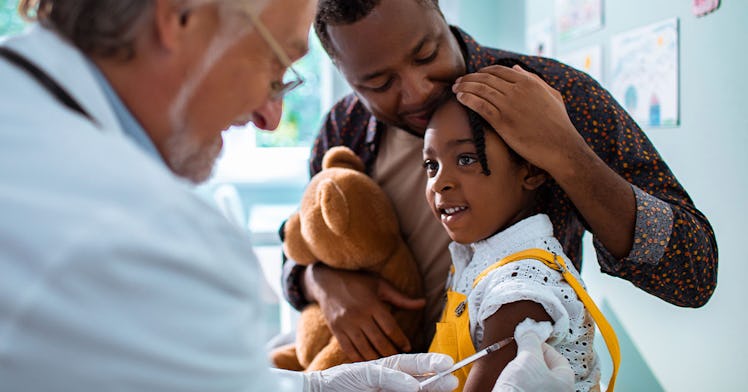Study: Dads More Willing to Vaccinate Their Kids Than Moms
A recent survey found that dads show less vaccine hesitancy than moms when it comes to COVID-19 and their kids.

A recent survey has found that fathers show far more willingness to vaccinate their children than mothers: while about 1 out of 4 mothers say they’re firmly resistant to letting their kids get the shot, only about 1 in 10 fathers feel the same way.
Considering that many public health officials say that vaccinating children is the key to finally reaching herd immunity in the U.S., or at least slowing the spread of COVID-19 and therefore the growth of variants, these findings mean that dads have an important role to play in advocating for vaccination in their own families.
But the study — which is also broadly focused on childhood vaccinations, and support for mandatory vaccinations for school attendance — has broad implications for other vaccines as well.
The survey came from the 50 States Project, a group of COVID-19 researchers from Rutgers, Harvard, Northeastern, and Northwestern universities. After surveying 7,000 parents across the U.S. in April, the researchers found that 27% of mothers say they are “extremely unlikely” to vaccinate their children, compared to 11% of fathers. (The researchers defined “parent” broadly to mean any adult caring for a child in their home.)
Mothers under the age of 36 are even more resistant to vaccines, with 31% firmly against vaccinating their kids. Age didn’t make much of a difference for dads.
Since researchers conducted a similar survey in February, they were able to track how attitudes are changing over time. The good news: fathers became slightly less likely to say they were resistant to vaccinating their kids. Mothers stayed about the same.
The bad news: divides between families based on income, education, and political party are only growing. Parents who are Republicans, don’t have a college degree, and make less than $25,000 a year became more resistant from February to April, while educated, high-income, and Democratic parents became less resistant.
Interestingly enough, the study also found that parents of older kids are more likely to be interested in vaccines for their children, while parents of small kids were more hesitant. Being a father was associated with being more willing to vaccinate while being a mom was associated with less willingness to vaccinate than other men and women respectively.
Another survey from Indiana University similarly found higher vaccine hesitancy among mothers than fathers, which researchers blamed on a “consumeristic model of medicine, coupled with widespread misinformation.” Based on a series of interviews with mothers, the study authors theorized that moms feel like they can control the risks of COVID-19 for their kids, but that they cannot control the potential risk of a vaccine.
These findings are even more important now that the Pfizer vaccine is available in the U.S. to all kids ages 12 and up and more approvals are surely on the way.
On June 4, CDC Director Rochelle Walensky issued an urgent statement on the importance of vaccinating teenagers as the cases among youth rise and adults decrease. 204 adolescents in the U.S. were hospitalized because of COVID-19 in January-March; while thankfully none died, one-third had to be admitted to an intensive care unit and 5% were put on mechanical ventilation.
“I am deeply concerned by the numbers of hospitalized adolescents and saddened to see the number of adolescents who required treatment in intensive care units or mechanical ventilation,” said Walensky. “Much of this suffering can be prevented.”
Yet dads are rarely seen as the primary target for public health campaigns.
This may be because mothers are often the primary decision-makers when it comes to health choices for their children. For example, previous research on vaccine hesitancy in New Zealand found that a father’s attitude about vaccines had little effect on whether his children were vaccinated, while the mother’s beliefs had far more impact.
Still, both parents have the right – and the duty – to speak up in their families, and advocate for what they see as the best health option for their kids.